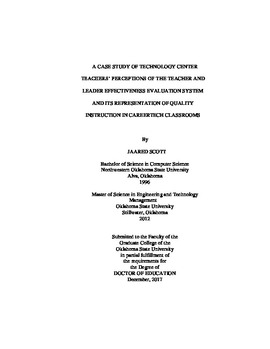| dc.contributor.advisor | Curry, Katherine | |
| dc.contributor.author | Scott, Jaared | |
| dc.date.accessioned | 2018-06-18T16:02:25Z | |
| dc.date.available | 2018-06-18T16:02:25Z | |
| dc.date.issued | 2017-12 | |
| dc.identifier.uri | https://hdl.handle.net/11244/300072 | |
| dc.description.abstract | Research suggests that teacher evaluation systems have promoted effective teaching in many common education classrooms for core academic subjects, but have not been as successful in promoting effective teaching in non-core subjects (Jacques & Potemski, 2013). Technology center classrooms are certainly an example of non-core subjects that may not be well represented on the TLE even though many technology centers have adopted the TLE as their evaluation instrument. One possible reason why teacher evaluation systems have not promoted more effective teaching in some technology center classrooms is that the skills/competencies of successful teaching in technology center classrooms may differ from skills/competencies measured on the TLE. According to a report by the Center for Innovative Technology (2010), a comprehensive teacher evaluation program has the potential to influence teacher performance and, ultimately, student achievement positively. However, for this tool to be effective, it must create a common language that defines and outlines specific behaviors/attitudes/skills that are valued by teachers for enhancing student outcomes (Center for Innovative Technology, 2010). It is possible that the skills and competencies outlined in Oklahoma's TLE do not align with skills/competencies that teachers in technology centers value. This case study used in-depth interviews of seven technology center teachers and two technology center administrators to explore their perceptions of the use of the TLE at their technology center. Data analysis revealed the following themes: 1.) All participants expressed that the TLE rubric does not represent the skills and competencies for effective teaching in their classrooms, 2.) Participants do not value the TLE or expect it to help them become more effective teachers, 3.) The majority of participants indicated that the TLE should include teacher subject matter expertise when evaluating their performance and 4.) The majority of participants indicated that program outcomes were a critical component of CareerTech teacher success and that this component was missing from the TLE. Consequently, this study suggests that the TLE neither creates the common language nor accurately defines the skills and competencies valued by the technology center teachers. | |
| dc.format | application/pdf | |
| dc.language | en_US | |
| dc.rights | Copyright is held by the author who has granted the Oklahoma State University Library the non-exclusive right to share this material in its institutional repository. Contact Digital Library Services at lib-dls@okstate.edu or 405-744-9161 for the permission policy on the use, reproduction or distribution of this material. | |
| dc.title | Case study of technology center teachers' perceptions of the Teacher and Leader Effectiveness Evaluation System and its representation of quality instruction in CareerTech classrooms | |
| dc.contributor.committeeMember | Harris, Ed | |
| dc.contributor.committeeMember | Mania-Singer, Jackie | |
| dc.contributor.committeeMember | Self, Mary Jo | |
| osu.filename | Scott_okstate_0664D_15429.pdf | |
| osu.accesstype | Open Access | |
| dc.type.genre | Dissertation | |
| dc.type.material | Text | |
| thesis.degree.discipline | Education Leadership | |
| thesis.degree.grantor | Oklahoma State University | |
